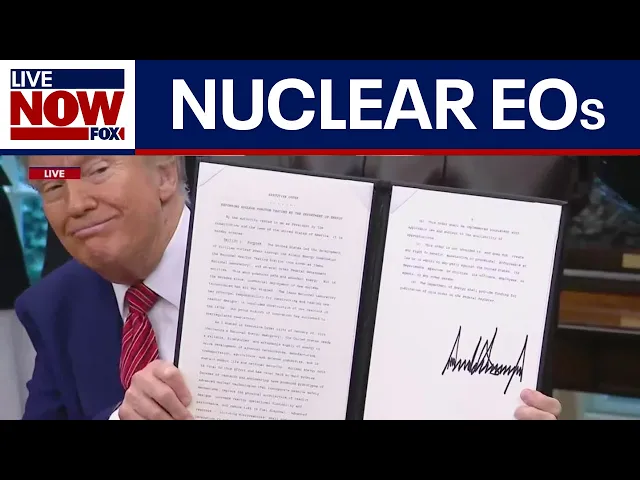WATCH FULL: Trump signs multiple EOs on nuclear energy and AI

Trump's energy pivot: nuclear power and AI
In a significant policy announcement that went beyond campaign rhetoric, former President Donald Trump unveiled a series of executive orders focused on nuclear energy expansion and artificial intelligence development. The move signals a potential shift in Republican energy policy that could reshape America's technological and energy landscape should Trump return to office. During his address, Trump outlined a vision that embraces nuclear power as a cornerstone of American energy independence while simultaneously advancing AI capabilities—two domains where the United States faces increasing international competition.
Key Points
-
Trump is positioning nuclear energy as a clean, reliable alternative to fossil fuels—representing a notable evolution in Republican energy policy that traditionally centered on oil and gas.
-
The executive orders aim to streamline regulatory processes for new nuclear plants, signaling an attempt to revitalize an industry that has stagnated under complex approval mechanisms.
-
There's a clear geopolitical dimension to these policies, with explicit references to countering China's growing dominance in both nuclear power deployment and artificial intelligence development.
-
Trump emphasized American energy independence through a diversified approach that includes nuclear alongside traditional fossil fuels—a "all of the above" strategy rather than fossil fuels alone.
-
The AI executive orders appear focused on reducing regulatory barriers while ensuring American leadership in this transformative technology.
The Nuclear Renaissance Strategy
The most compelling aspect of Trump's announcement is the explicit embrace of nuclear energy as a central component of America's energy future. This represents a significant departure from traditional Republican energy platforms that have historically emphasized fossil fuels almost exclusively. Nuclear power has long occupied an awkward political position—environmentalists concerned about waste and safety have opposed it, while many conservatives have been lukewarm at best, preferring to champion coal, oil, and natural gas.
This pivot matters tremendously in the context of climate policy and energy security. Nuclear power generates minimal carbon emissions while providing reliable baseload electricity generation that renewable sources like wind and solar cannot yet match consistently. Countries like France, which derives approximately 70% of its electricity from nuclear, demonstrate how this technology can dramatically reduce carbon emissions while maintaining energy independence.
The timing of this policy shift coincides with China's aggressive expansion of nuclear capacity. China has 22 new nuclear plants under construction—more than the rest of the world combined—and plans to build 150 new reactors in the next 15 years, representing a $440
Recent Videos
How To Earn MONEY With Images (No Bullsh*t)
Smart earnings from your image collection In today's digital economy, passive income streams have become increasingly accessible to creators with various skill sets. A recent YouTube video cuts through the hype to explore legitimate ways photographers, designers, and even casual smartphone users can monetize their image collections. The strategies outlined don't rely on unrealistic promises or complicated schemes—instead, they focus on established marketplaces with proven revenue potential for image creators. Key Points Stock photography platforms like Shutterstock, Adobe Stock, and Getty Images remain viable income sources when you understand their specific requirements and optimize your submissions accordingly. Specialized marketplaces focusing...
Oct 3, 2025New SHAPE SHIFTING AI Robot Is Freaking People Out
Liquid robots will change everything In the quiet labs of Carnegie Mellon University, scientists have created something that feels plucked from science fiction—a magnetic slime robot that can transform between liquid and solid states, slipping through tight spaces before reassembling on the other side. This technology, showcased in a recent YouTube video, represents a significant leap beyond traditional robotics into a realm where machines mimic not just animal movements, but their fundamental physical properties. While the internet might be buzzing with dystopian concerns about "shape-shifting terminators," the reality offers far more promising applications that could revolutionize medicine, rescue operations, and...
Oct 3, 2025How To Do Homeless AI Tiktok Trend (Tiktok Homeless AI Tutorial)
AI homeless trend raises ethical concerns In an era where social media trends evolve faster than we can comprehend them, TikTok's "homeless AI" trend has sparked both creative engagement and serious ethical questions. The trend, which involves using AI to transform ordinary photos into images depicting homelessness, has rapidly gained traction across the platform, with creators eagerly jumping on board to showcase their digital transformations. While the technical process is relatively straightforward, the implications of digitally "becoming homeless" for entertainment deserve careful consideration. The video tutorial provides a step-by-step guide on creating these AI-generated images, explaining how users can transform...
